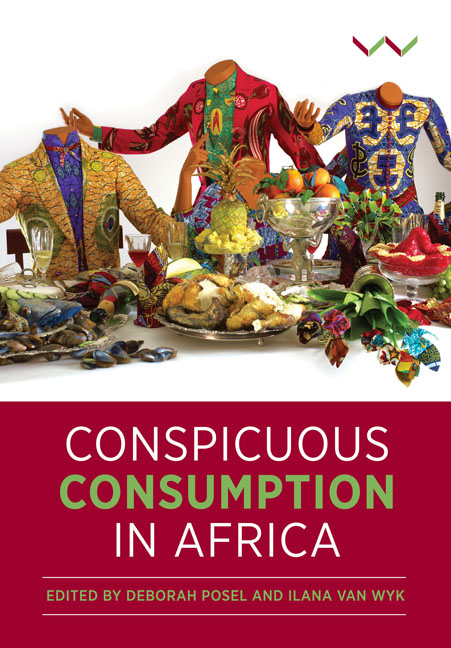Book contents
- Frontmatter
- Contents
- Acknowledgements
- List of Illustrations
- 1 Thinking With Veblen: Case Studies From Africa's Past and Present
- 2 Changes in the Order of Things: Department Stores and the Making of Modern Cape Town
- 3 Conspicuously Public: Gendered Histories of Sartorial and Social Success in Urban Togo
- 4 Etienne Rousseau, Broedertwis and the Politics of Consumption Within Afrikanerdom
- 5 Recycling Consumption: Political Power and Elite Wealth in Angola
- 6 Chiluba's Trunks: Consumption, Excess and the Body Politic in Zambia
- 7 Jacob Zuma's Shamelessness: Conspicuous Consumption, Politics and Religion
- 8 Precarious ‘Bigness’: a ‘Big Man’, His Women and His Funeral in Cameroon
- 9 Young Men of Leisure? Youth, Conspicuous Consumption and the Performativity of Dress in Niger
- 10 Booty on Fire: Looking at Izikhothane With Thorstein Veblen
- 11 Conspicuous Queer Consumption: Emulation and Honour in the Pink Map
- 12 The Politics and Moral Economy of Middle-Class Consumption in South Africa
- 13 Marigold Beads: Who Needs Diamonds?!
- Contributors
- Index
5 - Recycling Consumption: Political Power and Elite Wealth in Angola
Published online by Cambridge University Press: 29 October 2019
- Frontmatter
- Contents
- Acknowledgements
- List of Illustrations
- 1 Thinking With Veblen: Case Studies From Africa's Past and Present
- 2 Changes in the Order of Things: Department Stores and the Making of Modern Cape Town
- 3 Conspicuously Public: Gendered Histories of Sartorial and Social Success in Urban Togo
- 4 Etienne Rousseau, Broedertwis and the Politics of Consumption Within Afrikanerdom
- 5 Recycling Consumption: Political Power and Elite Wealth in Angola
- 6 Chiluba's Trunks: Consumption, Excess and the Body Politic in Zambia
- 7 Jacob Zuma's Shamelessness: Conspicuous Consumption, Politics and Religion
- 8 Precarious ‘Bigness’: a ‘Big Man’, His Women and His Funeral in Cameroon
- 9 Young Men of Leisure? Youth, Conspicuous Consumption and the Performativity of Dress in Niger
- 10 Booty on Fire: Looking at Izikhothane With Thorstein Veblen
- 11 Conspicuous Queer Consumption: Emulation and Honour in the Pink Map
- 12 The Politics and Moral Economy of Middle-Class Consumption in South Africa
- 13 Marigold Beads: Who Needs Diamonds?!
- Contributors
- Index
Summary
In 2015, Angolans were shocked by the airing of an episode of the American reality television show Say Yes to the Dress. The show generally follows a set script where an enthusiastic, but nervous, bride, accompanied by close friends and relatives, frequents an upscale bridal store in order to find her dream dress. The ultimate aim, of course, is to ‘say yes to the dress’, a moment that is usually accompanied by gasps, tears and smiles from the bride and her party as they see her in ‘the dress’ for the first time and imagine her perfect wedding and happy future. Everything seemed to be going perfectly to script when Say Yes to the Dress followed the wedding party of Naulila Diogo, daughter of the then Angolan Minister of Territorial Administration, Bornito de Sousa, as she arrived at the exclusive New York City-based bridal boutique Kleinfeld, accompanied by her mother and bridal party to purchase nine Pnina Tornai dresses. Two were for her, each decorated with hand-stitched Swarovski crystal details and additional luxuries, such as French lace and a tulle skirt that took 300 hours to make. Her mother had a hand-dyed pink dress, also with hand-stitched crystal details. The episode described Diogo as ‘Angolan royalty’ and gushingly explained that the over-US$200 000 bill that she had footed for the dresses was the most anyone had ever spent on the show. Diogo explained that she wanted her wedding of 800 people to be ‘bigger and better’ than any of the other weddings she had attended. Between the crystals, attendants and multiple dresses, it was a veritable orgy of conspicuous consumption, tied up in reality-television packaging as a model to be admired and emulated. The problem, however, was that the audience was not confined to the United States.
Dismayed Angolans eventually viewed the episode when it began to circulate online, and raised objections. The show had aired during the first year of the country's economic bust, following the fall of the international oil price near the end of 2014. Angolans wanted to know exactly how the daughter of a government minister could afford to spend US$200 000 on dresses.
- Type
- Chapter
- Information
- Conspicuous Consumption in Africa , pp. 79 - 95Publisher: Wits University PressPrint publication year: 2019



